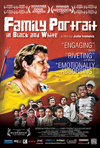Family Portrait in Black and White: Documentary by Julia Ivanova
Interfilm Productions
Vancouver, British Columbia, Canada
2011
Institutional Use: Double DVD (includes 85 and 52 minute versions)
Private Use: 85 minute DVD
Julia Ivanova, Director
Olga Nenya has 27 children. Four of them, now adults, are her biological children; the other 23 are adopted or foster children. Of those 23, 16 are biracial.
She calls them “my chocolates,” and is raising them to be patriotic Ukrainians. Some residents of Sumy, Ukraine, consider Olga a saint, but many believe she is simply crazy. An inheritance from the Soviet era, a stigma persists here against interracial relationships, and against children born as the result of romantic encounters between Ukrainian girls and exchange students from Africa. For more than a decade, Olga has been picking up the black babies left in Ukrainian orphanages and raising them together so that they may support and protect one another.
The filmmakers interview Neo-Nazis in Ukraine reveals the real dangers for a dark-skinned individual in the street. These white supremacist youth joke about their evening raids and how police seem to let them do it. Prosecutors are not particularly determined to give strict sentences to racially motivated crimes, and young thugs can get away with probation for beating someone nearly to death.
Olga sends her foster children to stay with host families in France and Italy in the summers and over Christmas, where they are cared for by charitable families who have committed to helping disadvantaged Ukrainian youth since the Chernobyl disaster. Olga’s kids now speak different languages, and the older girls chat in fluent Italian with each other even while cooking a vat of borscht. But Olga doesn’t believe in international adoption and has refused to sign adoption papers from host families that wanted to adopt her kids.
“At least when the kids grow up, they’ll have a mother to blame for all the failures that will happen in their lives,” she says.
AWARDS:
- 32nd GENIE AWARDS (Canada) (aka Canadian Oscars) “NOMINEE: Best Feature Documentary”
- 18th HOT DOCS FILM FESTIVAL (Canada) “Grand Prize: Best Canadian Film Award”
- 56TH VALLADOLID INTERNATIONAL FILM FESTIVAL (Spain) “Cultural Diversity Award” and “Time of History Third Prize”
- 6TH MIRADASDOC –DOCUMENTARY FILM FESTIVAL (Spain) “Audience Award”
- 6TH ADDIS INTERNATIONAL FILM FESTIVAL (Ethiopia) “Jury Award – Best Documentary”
SCREENINGS:
- Sundance Film Festival (USA)
- International Documentary Film Festival (Amsterdam)
- Los Angeles Film Festival (USA)
- Mumbai Film Festival (India)
- Haifa International Film Festival (Israel)
- Hamptons International Film Festival (USA)
- Cleveland International Film Festival (USA)
- Glasgow International Film Festival (UK)
- Thessaloniki Film Festival (Greece)
- Message To Man Documentary Festival (Russia)
- Bergen International Film Festival (Norway)
- Vancouver International Film Festival (Canada)
- New Zealand International Film Festival
- Seattle International Film Festival (USA)
- One World Film Festival (Romania, Czechoslovakia)
- Human Watch Film Festival (UK)
- Watchdocs (Poland)
What are the areas of interest? The major areas of interest covered by the film include:
- human rights
- critical mixed-race studies
- ideology
- institutionalization
- identity politics
- transitional economy
- international adoption
- foster homes
Who can benefit from the film? Family Portrait in Black and White is valuable for anyone with research interest in the following:
- African Studies
- Slavic Studies
- Child and Family Studies
- Sociology
- Women’s Studies
- Film and Media Studies
- Mixed-Race Studies
